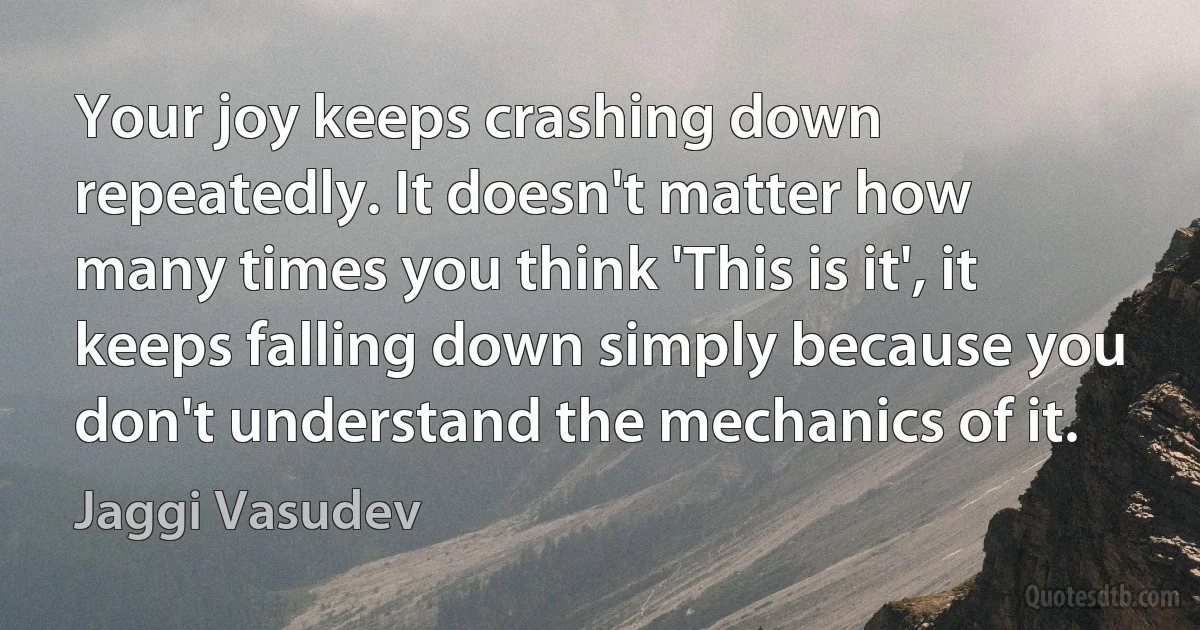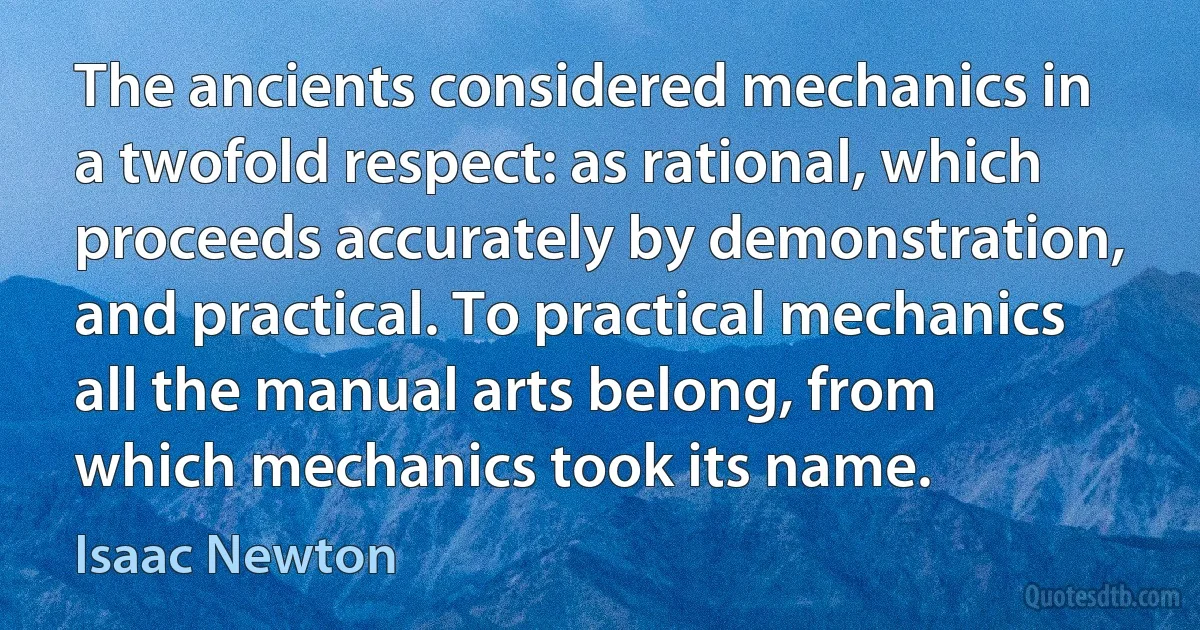Mechanics Quotes - page 7
I thought fit to... explain in detail in the same book the peculiarity of a certain method, by which it will be possible... to investigate some of the problems in mathematics by means of mechanics. This procedure is... no less useful even for the proof of the theorems themselves; for certain things first became clear to me by a mechanical method, although they had to be demonstrated by geometry afterwards... But it is of course easier, when we have previously acquired, by the method, some knowledge of the questions, to supply the proof than it is to find it without any previous knowledge.

Archimedes
First then I will set out the very first theorem which became known to me by means of mechanics, namely that
Any segment of a section of a right angled cone (i.e., a parabola) is four-thirds of the triangle which has the same base and equal height,
and after this I will give each of the other theorems investigated by the same method. Then at the end of the book I will give the geometrical [proofs of the propositions]...

Archimedes
We have already various treatises on Mechanics, but the plan of this one is entirely new. I intend to reduce the theory of this Science, and the art of solving problems relating to it, to general formulae, the simple development of which provides all the equations necessary for the solution of each problem. I hope that the manner in which I have tried to attain this object will leave nothing to be desired. No diagrams will be found in this work. The methods that I explain require neither geometrical, nor mechanical, constructions or reasoning, but only algebraical operations in accordance with regular and uniform procedure. Those who love Analysis will see with pleasure that Mechanics has become a branch of it, and will be grateful to me for having thus extended its domain.

Joseph Louis Lagrange
Not one word is said here of acausality, wave mechanics, indeterminacy relations, complementarity, ... etc. Why doesn't he talk about what he knows instead of trespassing on the professional philosopher's preserves? Ne sutor supra crepidam. On this I can cheerfully justify myself: because I do not think that these things have as much connection as is currently supposed with a philosophical view of the world.

Erwin Schrödinger
Quantum mechanics is weird. I don't understand it. Just live with it. You don't have to understand the nature of things in order to build cool devices...If you can figure out how to take advantage of this quantum multitasking, we can build computers that can do computations that no classical computer could do even if it were the size of the entire universe.

Seth Lloyd
Phenomena of the external sense are examined and set forth in physics; those of the internal sense in empirical psychology. Pure mathematics considers space in geometry and time in pure mechanics. To these is to be added a certain concept, intellectual to be sure in itself, but whose becoming actual in the concrete requires the auxiliary notions of time and space in the successive addition and simultaneous juxtaposition of separate units, which is the concept of number treated in arithmetic.

Immanuel Kant
The advent of the Computer age has stimulated a rapid expansion in the use of quantitative techniques for the analysis of economic, urban, social, biological and other types of systems in which it is the animate rather than in dominant role. At present, most of the techniques employed for the analysis of humanistic, i.e., human centred systems are adaptations of the methods that have been developed over a long period of time for dealing with mechanistic systems, i.e., physical systems governed in the main by-the laws of mechanics, electromagnetism, and thermodynamics. The remarkable successes of these methods in unraveling the secrets of nature and enabling us to build better and better machines have inspired a widely held belief that the same or similar techniques can be applied with comparable effectiveness to the analysis of humanistic systems.

Lotfi A. Zadeh
Rational mechanics must be the science of the motions which result from any forces, and of the forces which are required for any motions, accurately propounded and demonstrated. For many things induce me to suspect, that all natural phenomena may depend upon some forces by which the particles of bodies are either drawn towards each other, and cohere, or repel and recede from each other: and these forces being hitherto unknown, philosophers have pursued their researches in vain. And I hope that the principles expounded in this work will afford some light, either to this mode of philosophizing, or to some mode which is more true.

Isaac Newton
The ancients considered mechanics in a twofold respect; as rational, which proceeds accurately by demonstration, and practical. To practical mechanics all the manual arts belong, from which mechanics took its name. But as artificers do not work with perfect accuracy, it comes to pass that mechanics is so distinguished from geometry, that what is perfectly accurate is called geometrical; what is less so is called mechanical. But the errors are not in the art, but in the artificers. He that works with less accuracy is an imperfect mechanic: and if any could work with perfect accuracy, he would be the most perfect mechanic of all; for the description of right lines and circles, upon which geometry is founded, belongs to mechanics. Geometry does not teach us to draw these lines, but requires them to be drawn; for it requires that the learner should first be taught to describe these accurately, before he enters upon geometry; then it shows how by these operations problems may be solved.

Isaac Newton
The meaning of relativity has been widely misunderstood. Philosophers play with the word, like a child with a doll. Relativity, as I see it, merely denotes that certain physical and mechanical facts, which have been regarded as positive and permanent, are relative with regard to certain other facts in the sphere of physics and mechanics. It does not mean that everything in life is relative and that we have the right to turn the whole world mischievously topsy-turvy.

Albert Einstein
It is illuminating to note, here, how the daily rituals and working routines of prolific authors and artists - people who really do get a lot done - very rarely include techniques for 'getting motivated' or 'feeling inspired'. Quite the opposite: they tend to emphasise the mechanics of the working process, focusing not on generating the right mood, but on accomplishing certain physical actions, regardless of mood.

Oliver Burkeman
Explain it,” Hamilton muttered. "This place-this bar. Why doesn't God erase it? If this world operates by moral laws-”
"This bar is necessary to the moral order. This is a sinkpit of corruption and vice, a fleshpot of iniquity. You think salvation can function without damnation? You think virtue can exist without sin? That's the trouble with you atheists; you don't grasp the mechanics of evil. Get on the inside and enjoy life, man. If you're one of the Faithful, you've got nothing to worry about.”
"Opportunist.

Philip K. Dick
A North Korean soldier would later recall a buddy who had been given an American-made nail clipper and was showing it off to his friends. The soldier clipped a few nails, admired the sharp, clean edges, and marveled at the mechanics of this simple item. Then he realized with a sinking heart: If North Korea couldn't make such a fine nail clipper, how could it compete with American weapons?

Barbara Demick
One of the first speaking roles I had was in a film called 'Svengali', with Peter O'Toole and Elizabeth Ashley. I was a waiter, and I had about three lines. And I was ready! I had been around people like that, and I knew they were just actors. All the work I had done, it was all there, and I felt like I knew all the mechanics.

Tobin Bell



